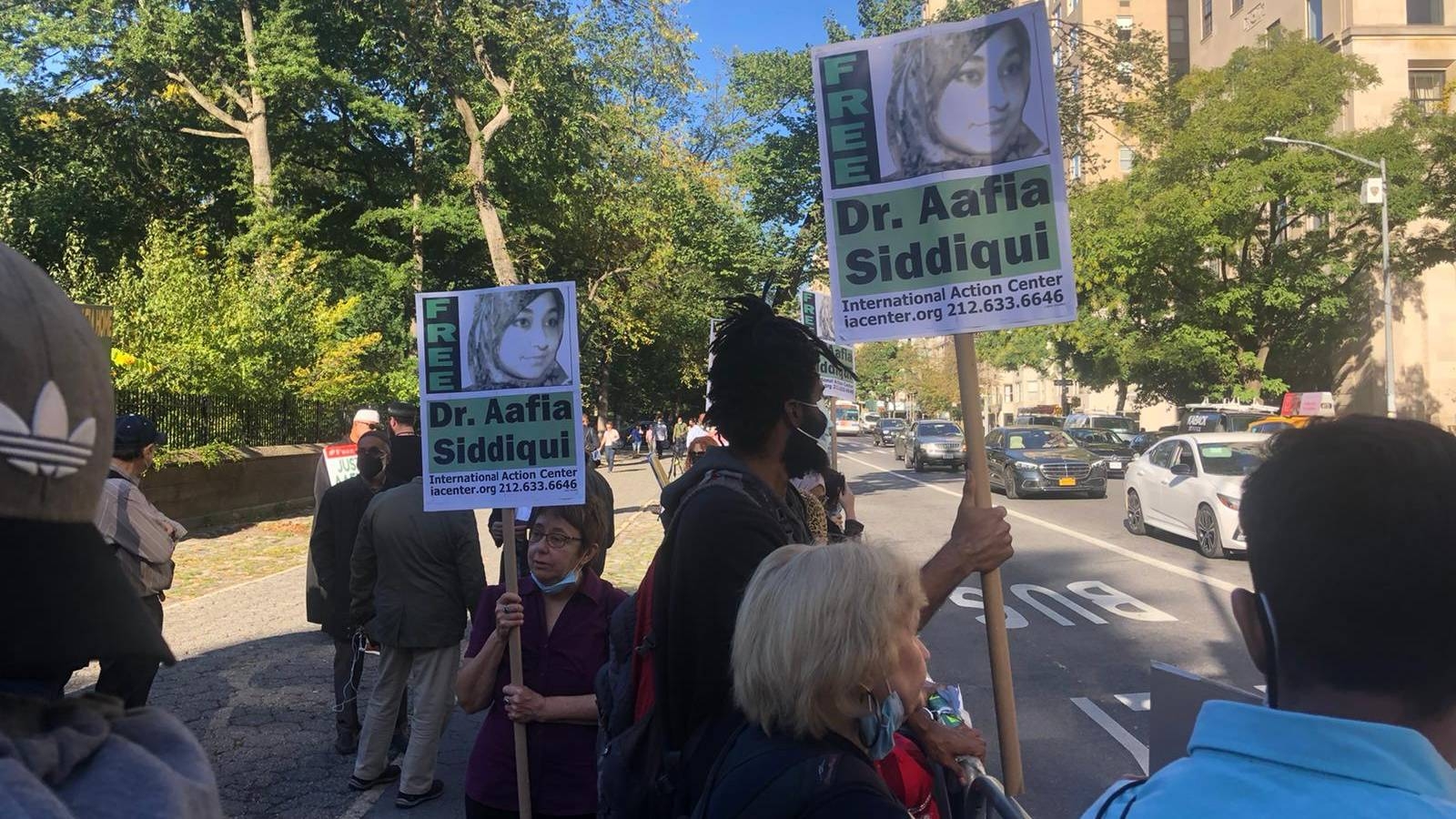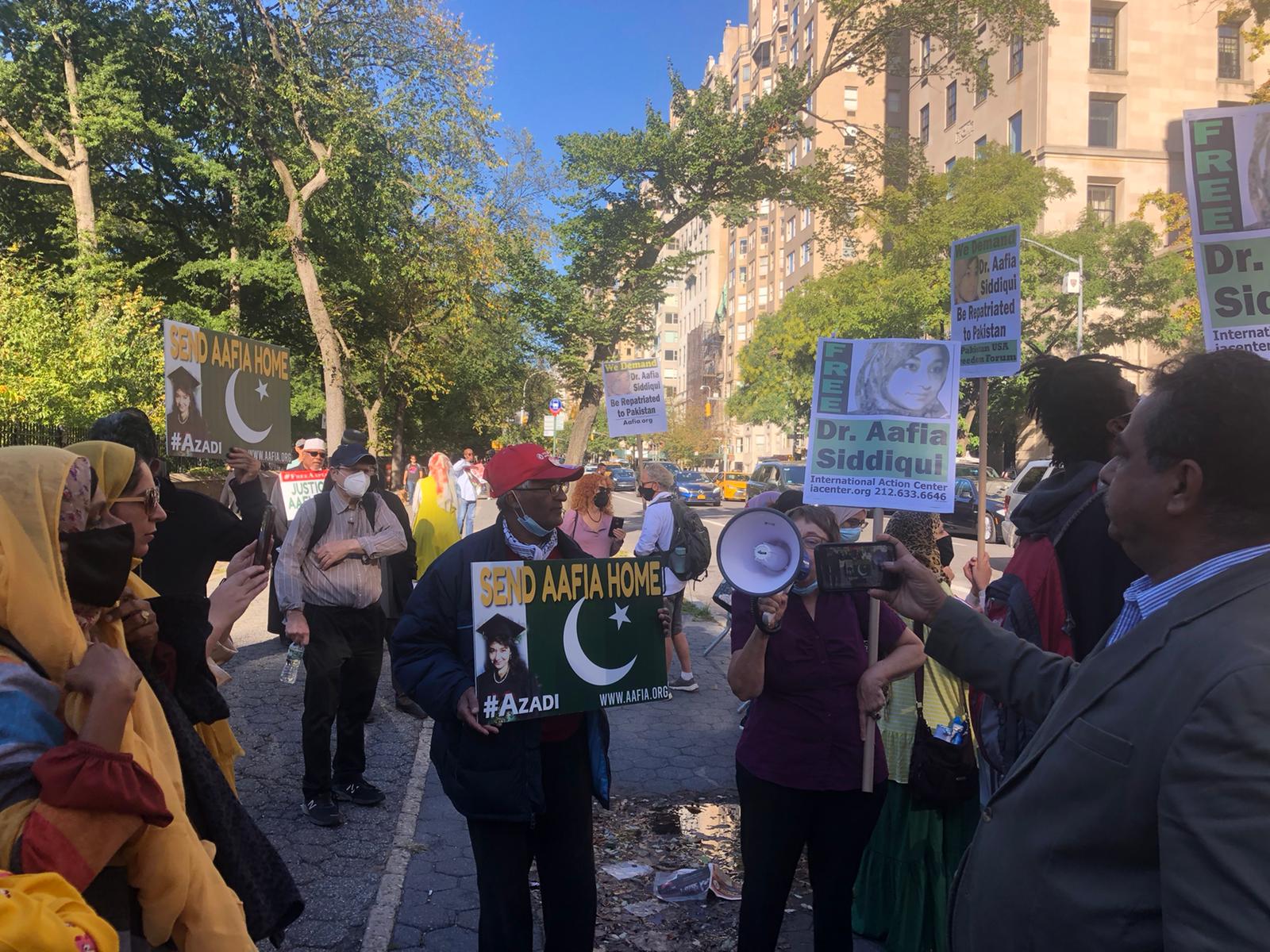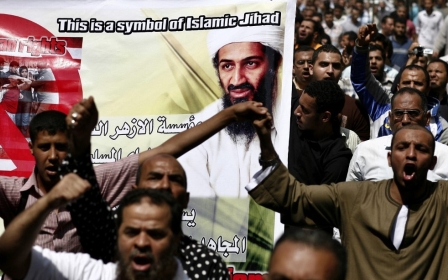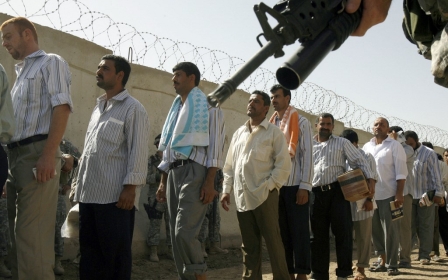'War on terror': US protesters urge release for Pakistani woman Aafia Siddiqui

Dozens of protesters stood outside Pakistan's consulate in New York City on Wednesday, calling for the release of Aafia Siddiqui, a Pakistani woman who is currently serving 86 years in prison in what civil liberties groups and activists say was an unjust sentencing as a result of the US "war on terror".
The demonstrators, who rallied in the same city where Siddiqui was convicted and sentenced more than 10 years ago, carried signs demanding she be repatriated to Pakistan, while chanting "Free our sister Aafia" and "Afia, Aafia, don't cry, we won't let your case die."
'We want to make sure her case isn't forgotten'
- Anwaar Huk, protest organiser
"The Pakistani government needs to pressure the US government to send her back," Anwaar Huk, an organiser of the rally, told Middle East Eye.
"This isn't an anti-Pakistan rally, Aafia is a Pakistani patriot," Huk said, "but we want to make sure her case isn't forgotten."
A graduate of the Massachusetts Institute of Technology and PhD scholar in neuroscience from Brandeis University, Siddiqui disappeared from her home in Karachi in 2003 and was later found in Ghazni, Afghanistan in 2008.
New MEE newsletter: Jerusalem Dispatch
Sign up to get the latest insights and analysis on Israel-Palestine, alongside Turkey Unpacked and other MEE newsletters
She was arrested, charged, and convicted in Manhattan Federal Court of the attempted murder of US officials and nationals, and later sentenced to 86 years of imprisonment.
In the indictment presented to the US court, prosecutors had said that Siddiqui possessed notes referring to a "mass casualty attack", with multiple locations listed as the target, including the Empire State Building and the Brooklyn Bridge.
Cage, a London-based rights group, has stated that her case is rife with inconsistencies, contradictory allegations and evidence obtained under torture.
While she was never charged with links to the militant group al-Qaeda, multiple attempts were made to connect her to the organisation, according to Cage.
"Aafia Siddiqui's case remains one of the most troubling in the sordid history of the 'War on Terror'. It is time this chapter of Aafia Siddiqui’s life was closed. She needs to go home and be with the children she never saw grow up," Moazzem Begg, an ex-Guantanamo prisoner and outreach director at Cage, said in a statement in August.
The protesters in New York, part of a five-city mobilisation effort to raise awareness about the case, said that Siddiqui has been wrongly imprisoned by the US.
Assault in prison
Huk said this was the third rally organised in the past month, with the first two taking place in the Texan cities of Houston and Dallas. The next protest will be held in Boston, followed by a final demonstration in Washington.
Civil liberties groups reported in August that Siddiqui had suffered a "serious violent assault" at the hands of another inmate, and her lawyers had called on prison authorities to ensure her safety.
Following the assault, Siddiqui was placed in administrative solitary confinement for an unknown period of time.
"During my last visit with Dr Siddiqui, I was shocked to see visible burns around her eyes, an approximately three-inch scar near her left eye, a wound on her right cheek covered in toothpaste and a small piece of paper, and bruises on her right arm and legs," Marwa Elbially, Siddiqui's lawyer, said at the time.
"It is important that we receive reassurance that Dr Siddiqui is not punished for being a victim of a vicious assault and is safe from future attacks."
Middle East Eye delivers independent and unrivalled coverage and analysis of the Middle East, North Africa and beyond. To learn more about republishing this content and the associated fees, please fill out this form. More about MEE can be found here.





